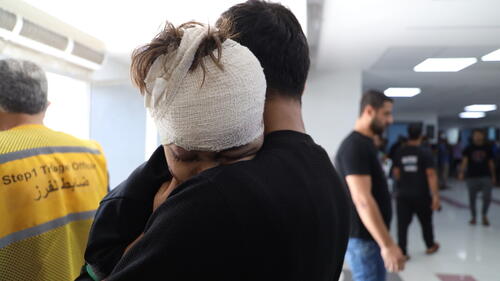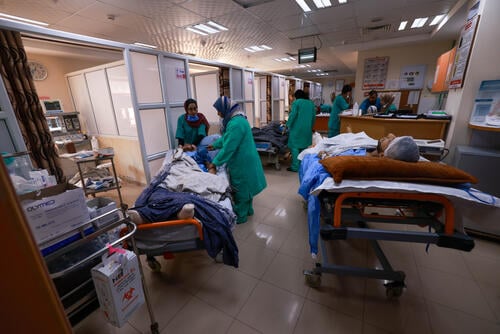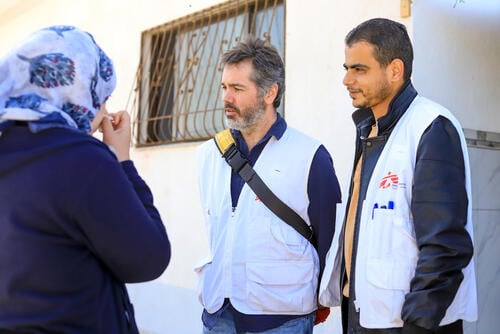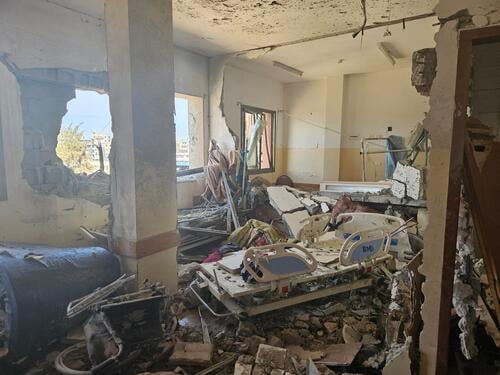Médecins Sans Frontières (MSF) teams have been responding to a growing humanitarian catastrophe in Gaza since the eruption of full-scale war between Israel and Hamas on 7 October. Thousands have been killed and injured on both sides.
On 9 October, Israel announced a total siege on Gaza, blocking food, water, electricity, and fuel for all residents. This is unconscionable and amounts to the collective punishment of 2.2 million Palestinians living in Gaza – nearly half of whom are children.
Civilians in Gaza are threatened by heavy aerial bombardment and indiscriminate attacks by the Israeli military. There have been at least 72 attacks on healthcare in Gaza, including facilities, ambulances, and medical staff.WHO sitrep, 23 October: https://www.emro.who.int/images/stories/palestine/WHO_oPt_Sitrep_6s.pdf?ua=1 MSF is calling for health workers and health facilities to be protected at all times, even in times of war. Hospitals should never be targeted.
Number of people killed since the start of the Hamas-Israel war on 7 October, according to WHO:
7,000
7,
1,400
1,4
Here are five ways the war is putting people’s lives and health at risk.
1. Evacuation orders threaten the lives of the most vulnerable
Late on 2 October, the Israeli military began warning the one million residents of northern Gaza to evacuate and move to the southern part of the territory within 24 hours. On 13 October, Israel gave MSF-supported Al-Awda hospital just two hours to evacuate, followed by a temporary reprieve.
There is simply no way to safely evacuate patients from a hospital. Bed capacity in southern Gaza has only one-third the bed capacity of the hospitals in the north.WHO sitrep, 23 October: https://www.emro.who.int/images/stories/palestine/WHO_oPt_Sitrep_6s.pdf?ua=1 There are not enough ambulances and roads are badly damaged.
These mass evacuation orders force sick and injured people – even those in critical condition – to risk their lives by either moving and fleeing south or by being left behind to face potential airstrikes; in either case to perhaps die without treatment. Many medical personnel also face impossible choices: whether to move south and seek shelter for themselves and their families, or stay behind to provide lifesaving care for their patients.
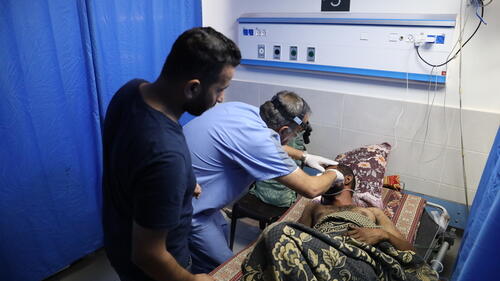
2. Hospitals cannot run without fuel and electricity
Hospitals in Gaza have been relying on generators since Israel cut off the electrical supply as part of the total siege. Generators run on fuel, however, and fuel reserves at hospitals across Gaza are nearly depleted; none of the very limited supplies that have been allowed into Gaza so far have included fuel.UNOCHA as at 26 October: https://www.ochaopt.org/content/hostilities-gaza-strip-and-israel-flash-update-20
When backup generators shut down for lack of fuel, it will be a death sentence thousands of patients whose survival depends on electricity. This includes 130 premature babies who are dependent on incubatorsWHO sitrep, 23 October: https://www.emro.who.int/images/stories/palestine/WHO_oPt_Sitrep_6s.pdf?ua=1 and those on life support or those receiving treatment for dialysis.
At Al-Shifa hospital, one of the main hospitals in Gaza City, fuel reserves are on the point of running out.
3. People are suffering from lack of access to essential medicines
The siege leaves no respite for patients in Gaza. In hospitals, medical teams are contending with limited supplies, equipment, and capacity even as more patients arrive following attacks.
At MSF-supported Al Shifa Hospital, Gaza’s main surgical facility, colleagues have reported a shortage of painkillers. Surgeons are operating on patients without sufficient anaesthesia. Pharmacies are running out of medicines. People with chronic illnesses could soon face life-threatening complications as a result of the shortage of medical supplies.
On 18 October, we provided all the supplies – medicines and medical equipment – we had left in our stock to Al-Shifa hospital.
Medical supplies were already limited in Gaza before the start of the current conflict due to the years-long blockade. We are preparing medical supplies to be sent to Gaza when access is open. We are calling for the urgent delivery of humanitarian aid into Gaza when safe access can be guaranteed.
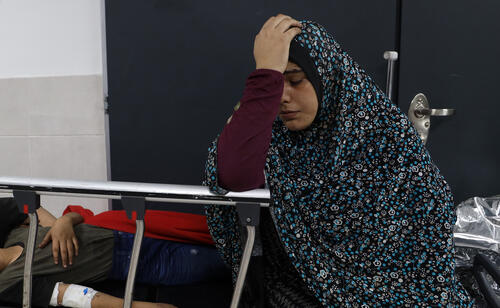
4. Hospitals and medical staff are overwhelmed and barely functioning
Medical care in Gaza is at breaking point. Medical staff are exhausted, terrified, and feeling powerless, as there is little they can do for patients, especially with the lack of medicines.
Two-thirds of basic healthcare facilities, such as clinics, are no longer functional, as are 12 out of 35 hospitals.UNOCHA as at 26 October: https://www.ochaopt.org/content/hostilities-gaza-strip-and-israel-flash-update-20
The hospitals that are running are completely overwhelmed. Al-Shifa hospital, Gaza’s main surgical hospital, where some of our Palestinian colleagues continue to work, has run out of space. The hospital has a capacity to treat 700 patients and is currently treating some 5,000. Surgeons have been forced to amputate limbs as patients lie on the floor.
Sick people often cannot even reach hospitals because of the state of the roads or lack of ambulances, or deem it too unsafe to do so due to the airstrikes.
5. Lack of clean water and overcrowded shelters increase the risk of disease
Access to clean water is now extremely scarce in Gaza, adding to people’s distress. People are at risk of dehydration. Many are drinking salty or contaminated water, which can make people sick.
The lack of access to clean water and damage to the water and sanitation infrastructure heighten the risk of waterborne diseases, such as cholera and diarrhoea.
They also further complicate poor hygiene conditions in the makeshift and overcrowded shelters where many displaced people are living in close quarters since fleeing northern Gaza. These conditions create fertile ground for diseases to spread rapidly, including respiratory tract infections.



